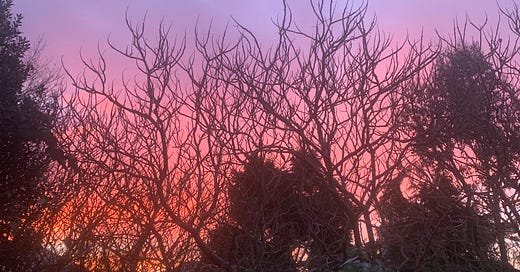'Tell me, what is it you plan to do with your one wild and precious life?'
Finding time in February, and Mary Oliver's words
When my daughter was smaller, she went to a Montessori nursery, where even the toddlers played with real china teapots, tidied up after themselves, and had open access to the paints. The little charges spent time brushing their own hair and teeth, and I remember once arriving early to collect her and seeing a line of tots waiting to scrape their own plates into the bin.
When I expressed incredulity at the nursery timetable and the notion that the little ones might paint for a solid hour, the leader smiled beatifically and told me, ‘It’s natural for children to concentrate.’
I’m sure much of Montessori teaching is nonsense — dressing up only as real world roles like nurses and firemen instead of fairies or dragons struck me as particularly daft — but I did in fact believe that most children could concentrate for long periods of time. It’s a skill to develop, and when I tried to get better at it, using the Pomodoro technique, I found it calmed my hummingbird brain. I wanted to focus. Back then, sleep deprived, on anti-depressants, homesick, I wanted to be able to deep-dive into something and stay there and finish it. Beneath the excuses and the busy, must-do-this-first, there was a patient side to me just waiting to be able to apply herself.
At home and at work, I try to give myself the grace of focus. If I don’t get out at lunchtime for a walk, by half four I’m exhausted and done.
I find that if I can stop the self-doubt, the excuse of there never being enough time, of needing to clean/cook/tidy instead, the procrastination that disguises itself as perfectionism but is really anxiety can rest. Quiet hours in the summer mornings if I can summon the energy to get up early, or forfeiting evening TV, or late at night, are times when I can apply myself. In her fantastic book Twelve Moons, Caro Giles describes waking early before her daughters to write, with candles and darkness and moonlight to accompany her.
Creativity needs space to flourish and grow. Time where everything else is put on the back burner. Ideally, quiet, too, but I can put my noise-cancelling headphones on and block the world out. I’ve been reading Mary Oliver recently, whose words cut through the snowstorm of activity.
‘Tell me, what is it you plan to do
with your one wild and precious life?’ she asks in The Summer Day.
And what is it we plan to do? Are you finding time each day, or even each week, to work towards whatever it is that you plan to do? I find that if I push the stones of my to-do list forward, even just a tiny bit, it makes for a more satisfying day.
Yesterday, I had some time to myself, and I baked a cake, worked on a project and watched a film I’ve wanted to watch for ages. Making time for each of these things — nothing ground-breaking, but each rewarding, cheered me up on a drizzly February more than I can say.
What are your top time-maximising tips? I’d love to hear them, and here are some of mine. Some of them are silly but they work for me:
If you hate disrupting your flow, make yourself a packed lunch the night before and stay at your desk to eat
Turn your phone AND watch onto Do Not Disturb
Take a flask of coffee and a bottle of water into your workspace
Drop as much housework as you can - ironing has no place when you are trying to create something
Try having a half hour walk first without headphones and planning your time
Do share yours below!





Loved this post, Alice. I recently started using the pomodoro technique too, and it's really been working well for me. I think that's my one tip from my years of trying to be more focused, or productive, or something. Knowing what works for you and, more importantly, when it stops working. I tried pomodoro before and it really, really didn't help me. But now it's working a treat. It may just be me who it works for, but mixing things up and constantly refreshing my routine etc based on what works right then, is what works best for me...if that makes sense.